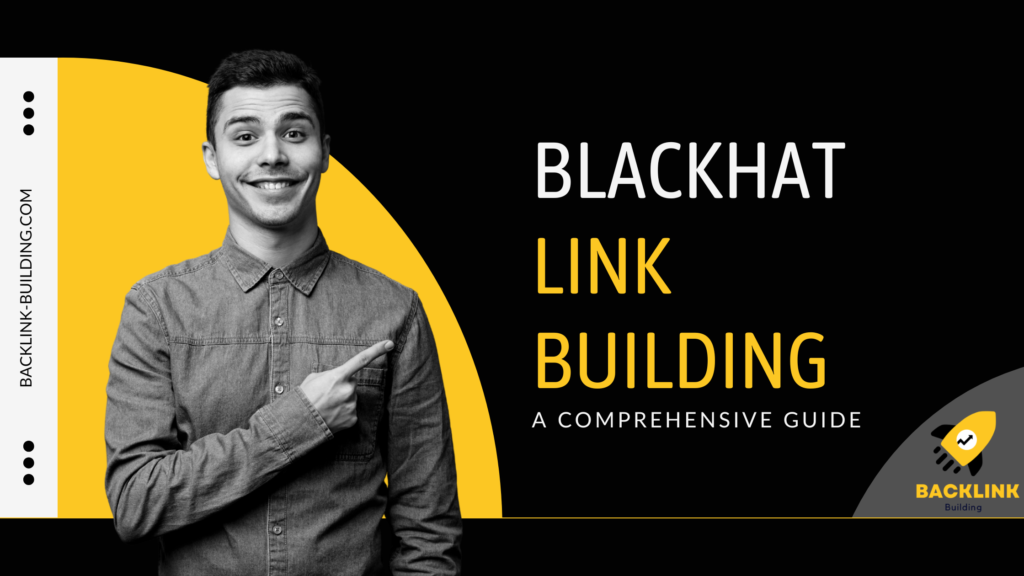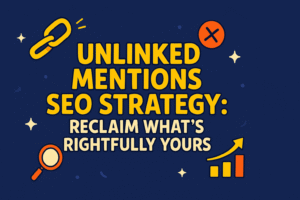
Link-building is a cornerstone of search engine optimization (SEO) in the dynamic and competitive realm of digital marketing.
Links are like currency online, influencing a website’s authority, visibility, and, ultimately, its rankings in search engine results pages (SERPs).
While legitimate and ethical methods of acquiring links exist, some practitioners resort to blackhat techniques, such as link building, to manipulate rankings quickly.
This comprehensive guide delves deep into the controversial world of blackhat link building, exploring its methods, risks, and ethical implications.
What Is Blackhat Link Building?
Blackhat link building refers to the unethical practices of manipulating search engine algorithms to boost a website’s ranking artificially.
These methods often violate search engine guidelines and can result in penalties or bans from search engine results pages (SERPs).
Blackhat techniques include buying links from low-quality or irrelevant sites, participating in link farms (networks of sites created solely for linking purposes), and indiscriminately using automated programs to make links across the web.
These tactics prioritize quantity over quality, disregarding the relevance and authority that legitimate links should provide.
By artificially inflating the number of inbound links, websites employing blackhat strategies seek to deceive search engines into perceiving them as more authoritative and relevant than they are.
Despite their potential short-term gains, blackhat practices carry significant risks. Search engines, like Google, continuously refine their algorithms to detect and penalize such manipulative tactics.
Penalties can range from lowered rankings to complete removal from search results, severely damaging a website’s online presence and reputation.
Whitehat link-building focuses on organic and ethical strategies, such as creating high-quality content that naturally attracts links, building relationships with influencers and web admins, and earning links through reputable means.
These approaches contribute to sustainable SEO growth and align with search engines’ goals of providing valuable and relevant content to users.
Benefits Of Blackhat Link Building

Here are five benefits of blackhat link building:
Quickly Boost Rankings:
- Blackhat techniques can often provide rapid increases in search engine rankings.
- By quickly obtaining links from various sources, websites can see immediate improvements in their SERP positions.
- This can be particularly useful for competitive keywords where quick gains are essential.
- Rapid ranking improvements can lead to increased traffic and visibility quickly.
- However, these gains are often short-lived and come with significant risks of penalties.
Cost-Effective Strategy:
- Blackhat link building can be cheaper upfront than whitehat methods like content marketing or organic outreach.
- Purchasing links or using automated tools to create links is cost-effective in the short term.
- It may appear as a quick fix for SEO needs without requiring substantial investment in content creation or outreach efforts.
- However, the long-term costs, including potential penalties and loss of reputation, can outweigh the initial savings.
- Cheap links often come from low-quality and irrelevant sites, harming a site’s authority.
Manipulate Search Engine Algorithms:
- Blackhat techniques exploit loopholes in search engine algorithms to manipulate rankings.
- This includes tactics like link farms, private blog networks (PBNs), and automated link-building tools.
- Websites using these methods attempt to inflate their authority and relevance artificially.
- Manipulating algorithms can lead to short-term gains in search visibility.
- Yet, search engines continuously update their algorithms to detect and penalize such manipulative practices.
Competitive Advantage:
- Some businesses use blackhat techniques in highly competitive industries to gain an edge.
- Temporary boosts in rankings can help these businesses outrank competitors in the short term.
- This can increase market share and visibility if competitors need to utilize similar tactics.
- However, competitors and search engines may report or detect these practices, leading to penalties.
- Sustainable competitive advantage through legitimate means like quality content and user engagement remains the best long-term strategy.
Testing Purposes:
- Some SEO practitioners use blackhat methods for testing and research purposes.
- Experimenting with different link-building techniques can provide insights into search engine behaviour.
- It helps SEO professionals understand what works and what doesn’t in a controlled environment.
- However, testing with blackhat techniques should never be applied to live, client, or long-term projects.
- Ethical SEO practices that align with search engine guidelines are crucial for sustainable growth and reputation.
Black Hat Link Building Techniques

Here are a few blackhat link building techniques:
1. Paid Links
Purchasing links from websites solely for SEO purposes violates Google’s guidelines. These links are often placed on low-quality, irrelevant sites for selling links. The intent is to artificially inflate a site’s authority, but search engine algorithms quickly detect such links.
2. Link Farms
Link farms are networks of websites created solely for linking to each other or a client’s website. These sites have little valuable content and exist solely to manipulate search engine rankings. Search engines actively penalize sites participating in or benefiting from link farms.
3. Private Blog Networks (PBNs)
PBNs are networks of authoritative-looking websites owned by the same entity. They are used to create links to a central website, aiming to manipulate search engine rankings. While PBNs may appear legitimate, they are against search engine guidelines and carry substantial risks.
4. Automated Link Building
Using software or scripts to generate links across the web is another blackhat tactic. These automated tools create thousands of links on forums, blog comments, and other platforms without regard for relevance or quality. Search engines easily identify such links, which can result in severe penalties.
5. Article Spinning and Duplicate Content
Creating spun articles (rewording existing content to appear unique) and distributing them across various sites with links is a blackhat tactic aimed at building links quickly, known as blackhat link building. Similarly, duplicating content across multiple sites to create backlinks is against search engine guidelines.
6. Comment Spamming
Posting irrelevant comments on blogs and forums to include a link to a website is a form of blackhat link building. This tactic not only annoys users but also risks penalties from search engines.
What Is The Difference Between Black Hat And White Hat Link Building?

Here are the differences between Black Hat and White Hat link building:
Ethics And Guidelines:
- White Hat: Adheres strictly to search engine guidelines and focuses on obtaining links through ethical means.
- Black Hat: Often disregards search engine guidelines and employs manipulative tactics to acquire links.
Techniques Used:
- White Hat: Relies on creating high-quality content, guest blogging on relevant sites, and earning links naturally through outreach and relationships.
- Black Hat: Involves practices such as buying links, link farms (networks of sites linking to each other), and spammy link exchanges.
Long-Term Impact:
- White Hat: Builds sustainable and long-lasting improvements in search rankings and credibility.
- Black Hat: This can lead to penalties from search engines, causing a drop in rankings or even removal from search results.
Focus on User Value:
- White Hat: Emphasizes providing value to users through informative and relevant content.
- Black Hat: Often focuses solely on manipulating search engines without considering user experience.
Risk Level:
- White Hat: Generally low risk, as strategies align with search engine guidelines and are less likely to result in penalties.
- Black Hat: High risk, as search engines penalize sites using manipulative tactics, which can severely impact rankings.
Timeframe for Results:
- White Hat: Results may take longer to achieve but are more sustainable over time.
- Black Hat: This can lead to quick, short-term gains in rankings, which are often temporary and result in severe consequences later.
Reversibility:
- White Hat: Strategies are reversible and generally do not require undoing harmful practices.
- Black Hat: Often requires cleaning up and disavowing harmful links or content to recover from penalties.
Accepted Practices:
- White Hat: Aligns with industry best practices and is supported by SEO professionals and communities.
- Black Hat: Generally frowned upon within the SEO community and can damage reputation and trust among peers.
Risks Of Blackhat Link Building

Here are ten risks associated with blackhat link building:
- Search Engine Penalties:
Blackhat link building violates search engine guidelines, risking severe penalties such as being removed from search results or deindexed entirely. This can devastate organic traffic and online visibility, damaging your website’s reputation and authority. - Damage to Reputation:
Associating with shady link-building tactics can tarnish your brand’s reputation. Users may perceive your site as untrustworthy or unethical, impacting customer trust and loyalty. Negative perceptions can spread quickly, hindering business credibility and future growth opportunities. - Loss of Trust and Authority:
Search engines prioritize user trust and authoritative content. Blackhat tactics undermine these principles by artificially inflating rankings, which erodes trustworthiness over time. Once discovered, your site may need help to regain credibility, making it harder to compete in your industry. - Increased Vulnerability to Algorithm Changes:
Search engines continuously update algorithms to combat spam and improve user experience. Websites relying on blackhat techniques are highly vulnerable to these updates, risking sudden drops in rankings and traffic. Recovery can be challenging, requiring extensive cleanup and rebuilding of trust. - Legal Risks:
Some blackhat practices, such as copyright infringement or unauthorized trademark use, can lead to legal consequences. These include receiving cease-and-desist letters, lawsuits, or fines, which can harm your finances and damage your brand’s legal standing and reputation. - Poor User Experience:
Blackhat techniques often prioritize search engines over user experience. This can promote irrelevant or low-quality content, frustrating visitors and increasing bounce rates. Negative user interactions signal to search engines that your site may not meet user intent, further impacting rankings. - Short-term Gains, Long-term Losses:
While blackhat methods may offer quick rankings boosts, these gains are typically short-lived. Once search engines detect manipulation, penalties are swift and severe, erasing any temporary benefits. Long-term strategies focused on quality content and legitimate SEO practices yield sustainable growth and resilience. - Blacklisting by Search Engines:
Persistent use of blackhat tactics can lead to your site being blacklisted by search engines. This drastic measure removes your site from search results altogether, making it nearly impossible for users to find you organically. Recovery from blacklisting is arduous and time-consuming, requiring complete reformulation of SEO strategies. - Negative SEO Attacks:
Engaging in blackhat practices opens your site to retaliatory negative SEO attacks. Competitors or disgruntled individuals may deliberately build toxic links to your site, triggering penalties and tarnishing your online presence. Monitoring and disavowing harmful links become critical to mitigate such risks. - Financial Costs of Cleanup:
Reversing the damage caused by blackhat link building requires significant financial investment. From hiring SEO experts to conducting comprehensive audits and cleanup campaigns, the costs can quickly escalate. Prevention is more cost-effective than rehabilitation, emphasizing the importance of ethical SEO practices.
Ethical Considerations
Beyond the risks of penalties and deindexing, ethical considerations are crucial in the debate over link-building practices.
Ethical link-building focuses on creating value for users, enhancing website authority through high-quality content, and building genuine relationships with other websites in the same industry or niche. Critical ethical practices include:
- Content Quality: Creating valuable, informative, and engaging content that naturally attracts links from reputable sources.
- Relationship Building: Establish genuine relationships with other website owners and influencers in your industry, encouraging them to link to your content based on merit.
- Transparency: Disclosing any sponsored or affiliate links to ensure transparency with users and search engines.
The Future of Link Building

As search engines become more sophisticated in detecting manipulative tactics, the future of link-building lies in ethical practices prioritizing user experience and content quality.
Algorithms such as Google’s PageRank algorithm continue to evolve to prioritize websites that provide valuable content and genuine user experiences over those that attempt to manipulate rankings through shortcuts.
Conclusion
Blackhat link building represents a shortcut that leads to dead ends for websites seeking sustainable growth and visibility.
While the temptation to use blackhat techniques may be strong, the risks far outweigh the rewards. Search engines like Google continue to refine their algorithms to combat manipulation, making sustainable, whitehat SEO practices the safest and most effective long-term strategy.
You should avoid using black hat techniques as you know them. These black hat techniques can harm your website’s reputation and also get your website penalized.
So, we recommend using only white hat techniques to build high-quality links.
Feel free to contact us if you need help with link building or other SEO services. We’re always happy to help!
If you have any questions about Blackhat link building, please leave them in the comment section. We would be happy to answer them.


